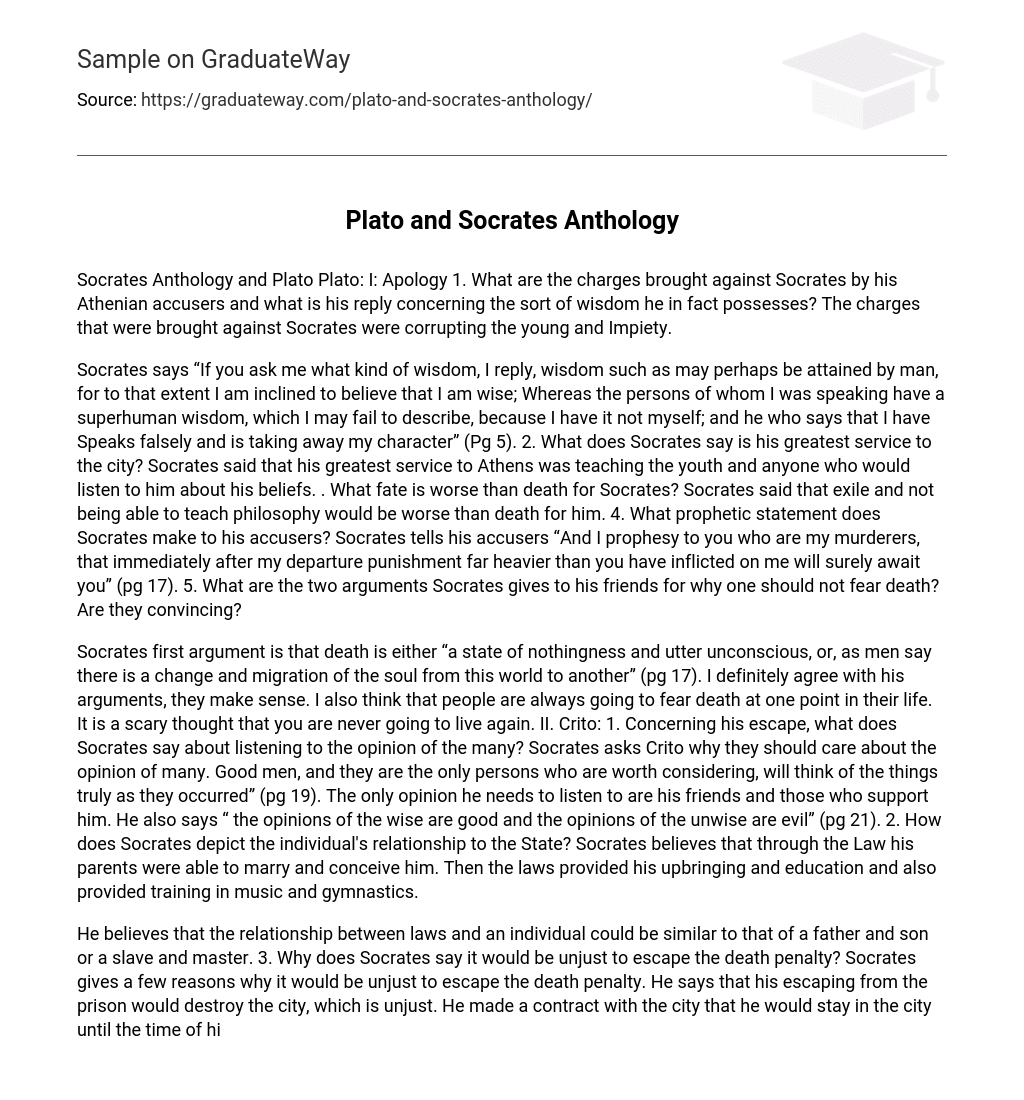Socrates Anthology and Plato Plato: I: Apology 1. What are the charges brought against Socrates by his Athenian accusers and what is his reply concerning the sort of wisdom he in fact possesses? The charges that were brought against Socrates were corrupting the young and Impiety.
Socrates says “If you ask me what kind of wisdom, I reply, wisdom such as may perhaps be attained by man, for to that extent I am inclined to believe that I am wise; Whereas the persons of whom I was speaking have a superhuman wisdom, which I may fail to describe, because I have it not myself; and he who says that I have Speaks falsely and is taking away my character” (Pg 5). 2. What does Socrates say is his greatest service to the city? Socrates said that his greatest service to Athens was teaching the youth and anyone who would listen to him about his beliefs. . What fate is worse than death for Socrates? Socrates said that exile and not being able to teach philosophy would be worse than death for him. 4. What prophetic statement does Socrates make to his accusers? Socrates tells his accusers “And I prophesy to you who are my murderers, that immediately after my departure punishment far heavier than you have inflicted on me will surely await you” (pg 17). 5. What are the two arguments Socrates gives to his friends for why one should not fear death? Are they convincing?
Socrates first argument is that death is either “a state of nothingness and utter unconscious, or, as men say there is a change and migration of the soul from this world to another” (pg 17). I definitely agree with his arguments, they make sense. I also think that people are always going to fear death at one point in their life. It is a scary thought that you are never going to live again. II. Crito: 1. Concerning his escape, what does Socrates say about listening to the opinion of the many? Socrates asks Crito why they should care about the opinion of many. Good men, and they are the only persons who are worth considering, will think of the things truly as they occurred” (pg 19). The only opinion he needs to listen to are his friends and those who support him. He also says “ the opinions of the wise are good and the opinions of the unwise are evil” (pg 21). 2. How does Socrates depict the individual’s relationship to the State? Socrates believes that through the Law his parents were able to marry and conceive him. Then the laws provided his upbringing and education and also provided training in music and gymnastics.
He believes that the relationship between laws and an individual could be similar to that of a father and son or a slave and master. 3. Why does Socrates say it would be unjust to escape the death penalty? Socrates gives a few reasons why it would be unjust to escape the death penalty. He says that his escaping from the prison would destroy the city, which is unjust. He made a contract with the city that he would stay in the city until the time of his death and breaking this contract would be unjust. His unjustness would also cause trouble for other people. His friends could be driven into exile, deprived of their citizenship and lose their property” (pg 25), or if he decided to flee to another city that is well governed Athens will come to them as an enemy and the city will turn on him. III. Phaedo 1. Why is suicide not an option for Socrates? He says that man is not permitted to be his own benefactor and he must wait for the hand of another and wait until God summons him. 2. How does Socrates explain the idea that a true philosopher is always pursuing death? Socrates explains to Crito that “Philosophers, in their search for truth, have attained a state as close to death as possible”.
They welcome death and do not fear it because it proves that they have courage and are brave. He also says “pursuit of wisdom will cleanse the philosopher of all the impurities of bodily life and its passions, preparing him for an exalted afterlife among the gods”. 3. How does Socrates use the argument from opposites to prove the immortality of the soul? Socrates says that everything that comes to be, comes from its opposite. He asks Cebes if there is an opposite of living. He suggests that there is an immortal soul that lives on in the next world after death. He thinks that after death the soul returns to live in another body on Earth. . Explain the theory of recollection and show how Socrates thinks it proves the preexistence of the soul? The theory of Recollection explains that it can be possible to draw information out of someone who doesn’t seem to have any knowledge of a subject before being questioned about it. He believes that the person in his story’s answers came from recollections of knowledge 5. How does Socrates explain the relation between the soul and the body in terms of the unchangeable and the changeable? Socrates believes that things are constantly changing and are compounded as well as not compounded.
He says that the soul is not compounded because it does not change and we do not sense it. The body would in turn be compounded because we can sense change for example pain. 6. What is the philosopher’s attitude toward the pleasures of the body and the attainment of true happiness? Philosophers feel that it is necessary to distance their soul from their body because it interferes with true wisdom and happiness. As for their attitude toward the pleasures of the body, Socrates says, pleasure of the body tie the soul to it which is why they need to distance their soul from the body.





